2023山西中考英语试卷真题有答案
英语一直以来都是初高中生的“心病”,虽然初中生已经接触英语几年了,但学起来依然很费力气,每次考试想拿高分并不容易。下面是小编分享的2023山西中考英语试卷真题有答案,欢迎大家阅读。
2023山西中考英语试卷真题有答案
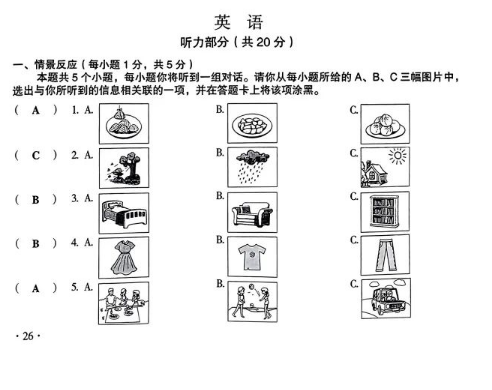
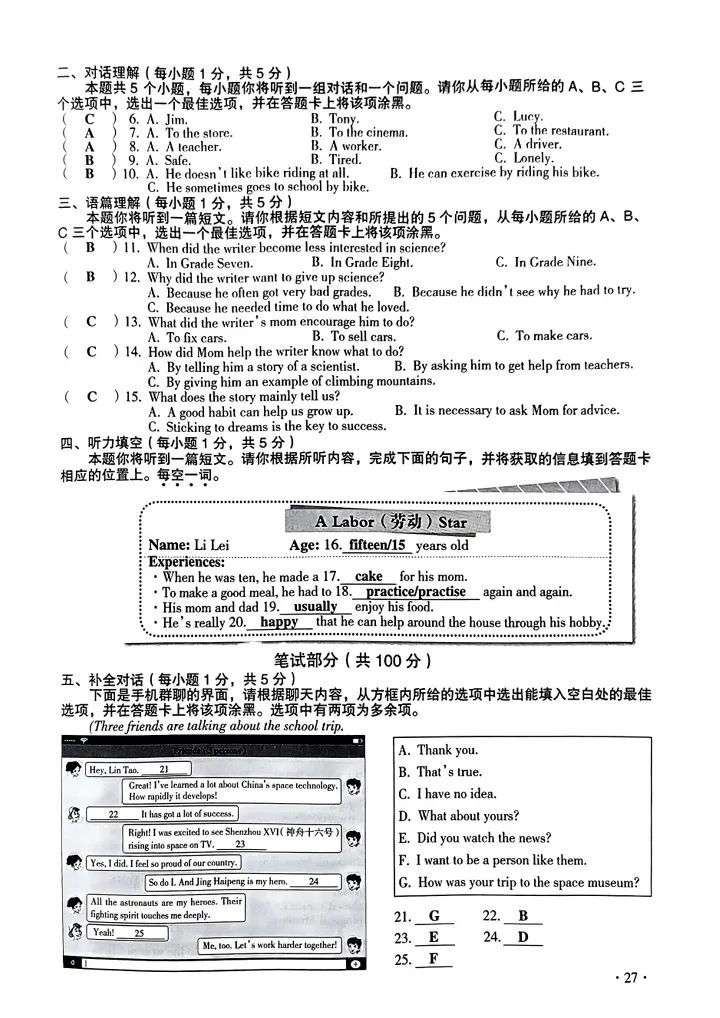
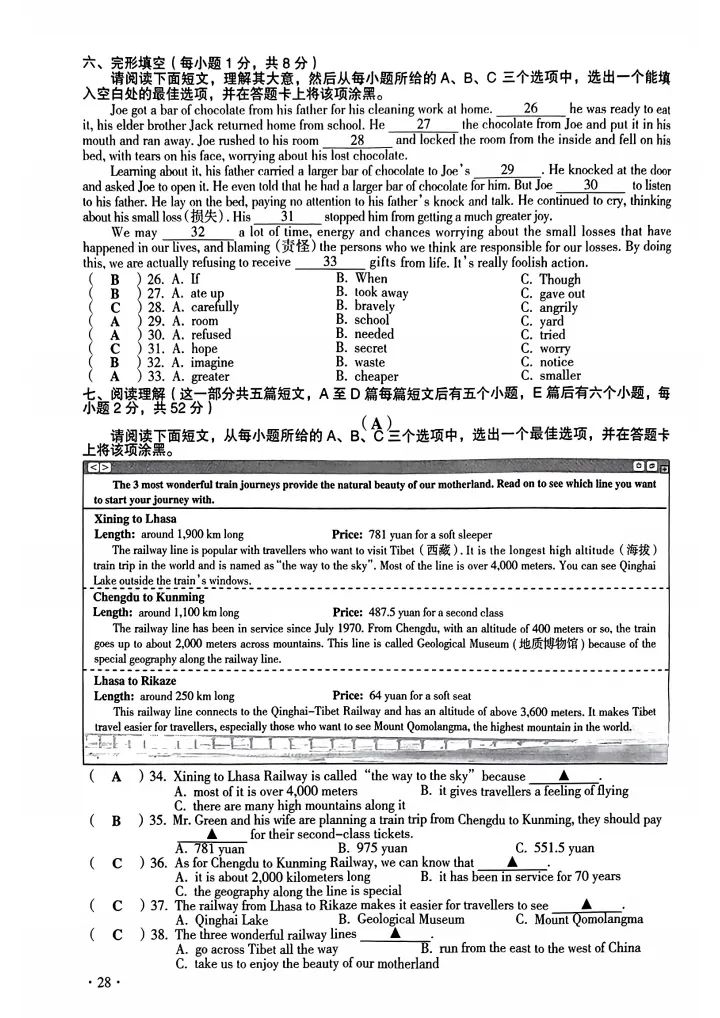
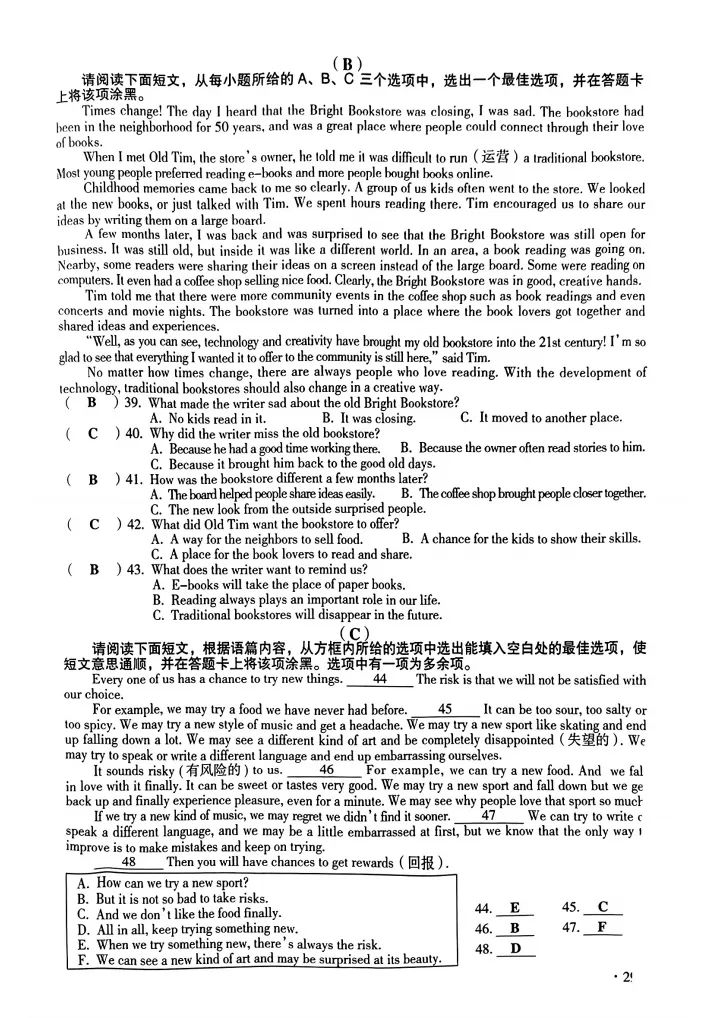
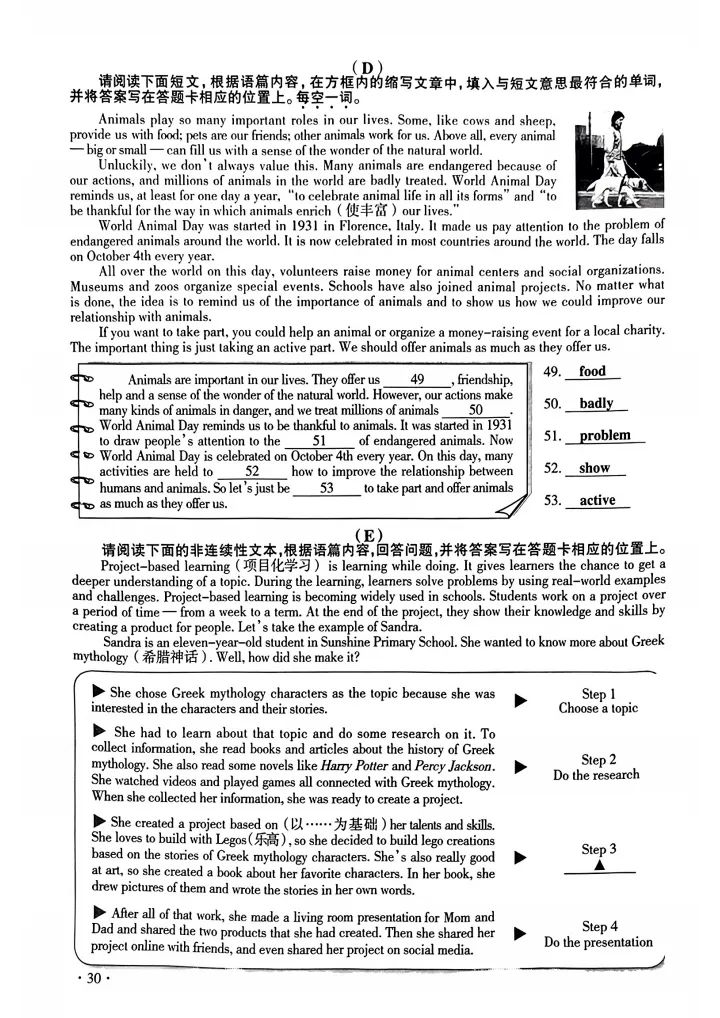
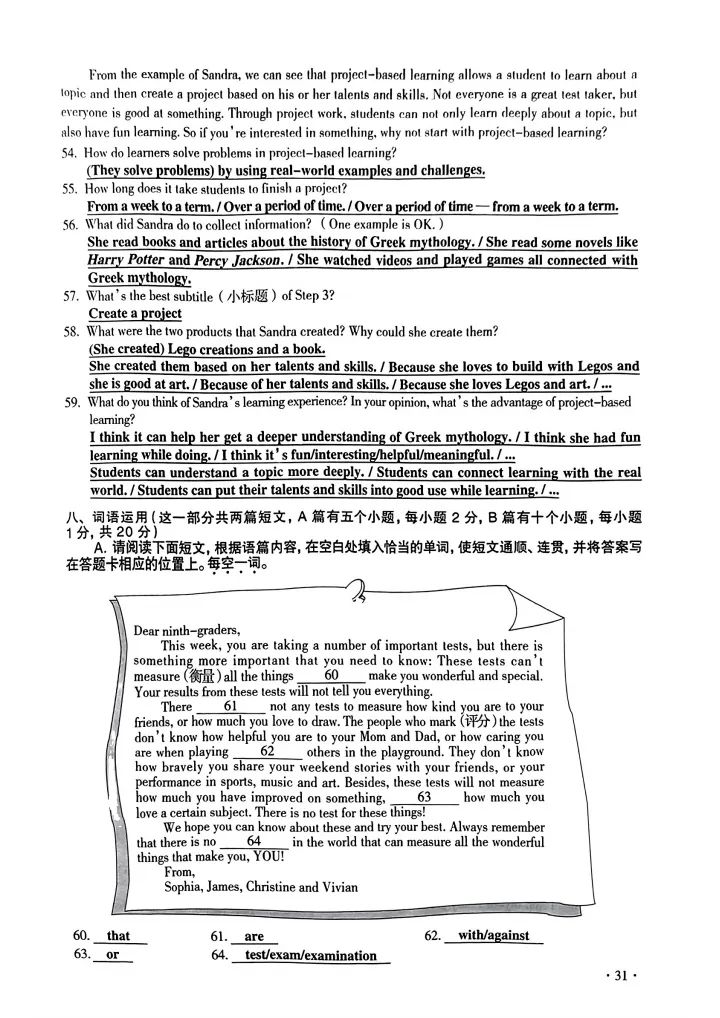
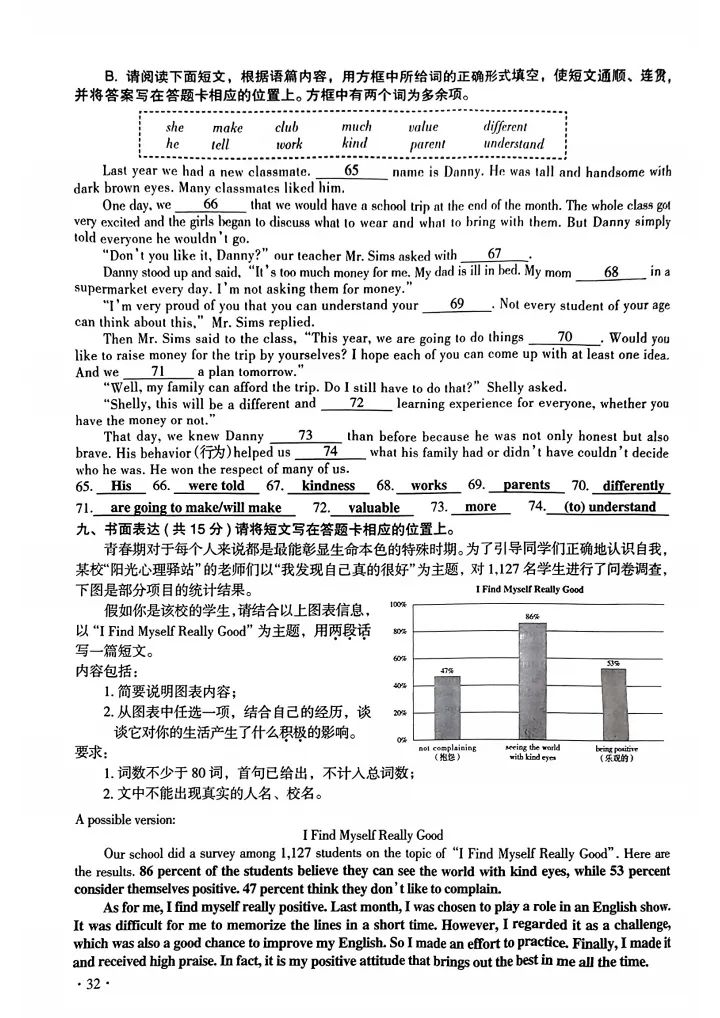
中考英语知识点:八种基本时态
1. 一般现在时
概念: 表示经常发生的动作或经常存在的状态。
常和 always , often , usually , sometimes , every day 等表时间的状语连用。
如:1) I go to school every day . 我每天都去学校。(表经常)
2) He is always like that . 他总是那样。 (表状态)
构成: 1) 主语 + be (am / are / is ) +……
2) 主语 + 实义动词/三单动词 + …
2.一般过去时
概念: 1) 表示过去某个时间发生的动作或存在的状态.
常和表示过去的时间状语连用. 如: yesterday , last week , in 1998 , two days ago等.
如: I went to a movie yesterday. 我昨天去看了一场电影.
2) 也可表示过去经常或反复发生的动作.
如: He always went to work by bike last week.
构成: 1) 主语 + be (was / were ) +……
2) 主语 + 实义动词过去式 +
3. 现在进行时
概念: 表示现在(说话瞬间)正在进行或发生的动作.
如: He is singing.
They are watching TV now.
构成: 主语 + 助动词be(am/are/is) + 动词-ing形式构成.
4. 过去进行时
概念: 表示过去某一时刻或某一段时间正在进行的动作. 这一特定的过去时间除了有上下文暗示外,一般用时间状语来表示.
如: 1) ---What were you doing?
---I was jumping.
2) ---What was the boy doing when the UFO arrived?
---He was sleeping.
构成: 主语 + 助动词be(was/were) + 动词-ing形式构成.
5. 一般将来时
概念: 表示将来某个时间要发生的动作或存在的状态,也表示将来经常或反复发生的动作,常与表示将来的时间状语连用,如: tomorrow, next week, next year, in the future等.
如: He will go shopping tomorrow.
They are going to play basketball next week.
构成: 1) 主语 + 助动词will + 动原 +…
2) 主语 + be going to + 动原 + ….
6. 过去将来时
概念: 表示在过去将来的某一时间发生的动作或存在的状态.
构成: 1) 主语(第一人称) + 助动词should + 动原 +…
2) 主语 + would + 动原 + ….
3) 主语 + was/ were going to +动原…
用法: 过去将来时除了上下文暗示外,一般常用在间接引语中,主句谓语动词为过去时态.
如: 1) I should go.
2) You knew I would come.
3) They were going to Naning.
7. 现在完成时
构成: 主语 + 助动词 ( have / has ) + 动词过去分词 +…
用法 例句
表示过去发生或已经完成的动作对现在造成的影响或结果. ---Have you had your lunch yet?
---Yes, I have. (现在我不饿了)
8. 过去完成时
构成: 主语 + 助动词 had + 动词过去分词 +…
用法 例句
表示过去在过去某一时间或动作之前已经发生或完成了的动作.它表示的动作发生的时间是”过去的过去”.表示过去某一时间可用by, before 等构成的短语,也可用when, before, 等引导的从句或者通过上下文表示.
I had finished my homework when my mom came back home.
中考英语知识点:部分否定的表示方法
1.all的否定式:
not all…(或:all…not)表示“并非都……”、“不是所有的都……”例如:Not all bamboo grows tall.并非所有的竹子都会长得很高。
2. both 的否定式:
not…both (或:both… not) “并非两个……都……”例如:I don't want both the books. 我不是两本书都要。
3.every…的否定式:“不是每……都……”例如:Not every book is educative. (或:Every book is not educative.) 不是每本书都有教育意义的。
4.always的否定式:“并非总是(并非一直)……”例如:He is not always so sad. 他并不是一直都这样悲伤。
5.entirely, altogether, completely 和quite 的否定式:“不完全……”,“并非完全……”例如:
The businessman is never to be entirely trusted.不可以完全信任商人。
6.all the time 的否定式:“并非一直……”、“未必老是……”例如:A foolish man doesn't make a mistake all the time. 笨人未必老是犯错误。
7.not…and…的否定式,被否定的往往是and后面的那一部分。例如:He did not speak clearly and correctly. 他讲得清楚但不正确。
中考英语语法重点与难点
1、 as…as…结构:你和汤姆是一样好的孩子。
You’re a boy as good as Tom.=You’re as good a boy as Tom.
2、 (1)too…to与 so…that sb. can’t…的句型转换:前者为简单句,主语只有一个,而后者为复合句,主语有两个,试比较:
The man was too angry to be able to speak.
The man was so angry that he wasn’t able to speak.
(2) too…to…与 not enough to句型的转换:
He is too young to get married.=He is not old enough to get married.
The book is too difficult for me to read.=
The book is not easy enough for me to read.
3、 形容词原级表示比较级含义:
约翰不象迈克那么苯。
John is not so stupid as Mike.
John is less stupid than Mike.
John is cleverer than Mike.
4、 用比较级表示最高级:约翰是班里最高的男生。
John is taller than any other boy in the class.
John is the tallest boy in the class.
5、 the more….. the more….表示“越……越……”:
The more books you read, the wider your knowledge is.
The more food you eat, the fatter you are.
6、 more and more….表示“越来……越……”:
More and more students realized the importance of a foreign language.
Our country is getting stronger and stronger.
中考英语知识点:情态动词
1.考查情态动词表示“推测”的用法
[考点快忆] 表示肯定推测的情态动词有:must“一定;准是”,may“也许;可能”,might“或许”;表示否定推测的情态动词有:can't“不可能”, couldn't“不会”,may not“也许不”,might not“或许不”;can表示推测时不用于肯定句,may表示推测时不用于疑问句。
2.考查情态动词引起的一般疑问句的答语
[考点快忆] 回答must时,肯定答语用must,否定答语用needn't或don't have to。回答need时,肯定答语用must,否定答语用needn't。回答may时,肯定答语用may,否定答语用mustn't 或can't。
3.考查情态动词的意义
[考点快忆] must “必须”;have to“不得不”;need “必须;需要”;can(could)“能;可能”;may (might) “可以;可能”;shall,will (would)“将;会;愿意;要”;should“应当”。
“had better (not) + 动词原形”表示建议;have to / has to / had to的否定,疑问形式要借助于助动词do / does / did。